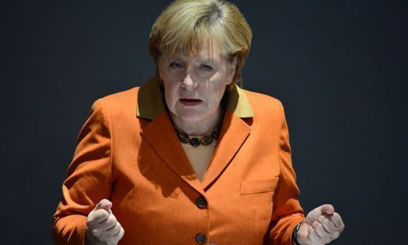As workers in Greece went on strike against new austerity cuts, European Union leaders were set to weigh Merkel’s demands at a summit kicking off at 1500 GMT where many will want more solidarity from Berlin in exchange for tighter discipline.
On one of the most controversial measures to be discussed, Merkel told the German lower house of parliament that the EU’s economic affairs commissioner should have the authority to declare a member state’s budget “invalid.”
At a June summit, held as the eurozone debt crisis raged threatening to bring down Spain, EU leaders agreed they must move towards much tighter coordination of economic policy if the euro was to survive.
In addition, they would put in place a single ‘banking union’ supervisor by the end of the year, a key step to allow the new European Stability Mechanism (ESM) rescue fund to begin recapitalising stricken states’ lenders.
But implementation is fraught, with many governments reluctant to cede more power to Brussels, especially on national budgets and tax. Britain and other non-euro states worry what the proposed European bank regulator will mean for their lenders.
There are also serious differences over some of the June summit commitments, especially on the role the ESM can play in dealing with banks that some states — Ireland and Spain, for example — have already bailed out.
Officials accordingly played down expectations ahead of the two-day gathering, describing it as a stock-taking exercise before a November meeting on the EU’s 2014-2020 budget and then a December make-or-break summit on end-2012 commitments.
Merkel on Thursday urged instead the need for progress.
“We believe … we could go further by granting the European level real rights to intervene in national budgets” which flout EU fiscal rules, she said, adding that “unfortunately” some EU states were not ready for such a step.
Merkel said Germany, Europe’s biggest economy and paymaster, remains opposed to any pooling of eurozone debt whereby member states, weak and strong alike, would issue common eurobonds to raise funding.
Some such as France see this as part of a move towards centralised budget-making but Berlin fears it would only give weaker eurozone states who have not stuck to the fiscal rules a free ride in the markets at its expense.
The eurozone debt crisis meanwhile continues to test the EU given persistent uncertainty over Greece, the epicentre of the eurozone debt crisis, and Spain, which is under pressure.
Greece suffered Thursday its fourth anti-austerity general strike of the year that severely disrupted transport and highlighted again popular outrage at the tough austerity measures agreed in return for bailouts.
Unions said they will not tolerate a third straight year of cuts to wages, pensions and benefits while unemployment soars to 25 percent.
At the same time, Spain appears finally to be ready to seek a limited bailout using the ESM which would in turn allow the European Central Bank (ECB) to intervene on public debt markets, pushing down borrowing costs for Madrid.
Figures Thursday showing that bad loans held by Spanish banks soared to a record high in August were a reminder that the problem will not go away without action.
French President Francois Hollande, who has been pushing the banking union proposal — on which Berlin is notably less enthusiastic — said Wednesday that the eurozone was now “close, very close” to the end of the debt crisis.
It was the eurozone and EU’s “duty” to rapidly implement the decisions agreed at the June summit, he said, arguing that they were the best way to strengthen the bloc against any repeat of the debt crisis.









































